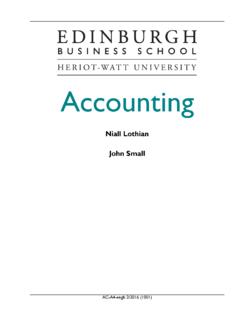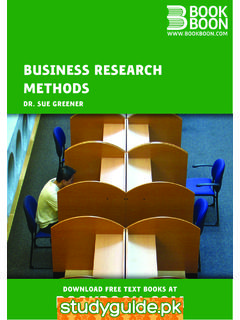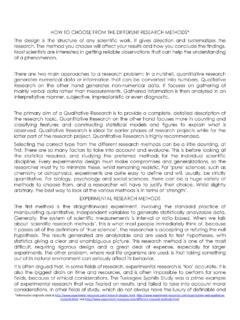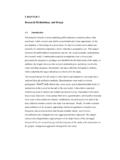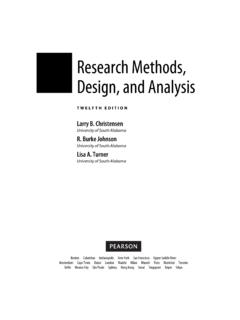Transcription of Research Methods for Business and Management
1 BM-A2-engb 2/2013 (1034) Research Methods for Business and Management Devi Jankowicz This course text is part of the learning content for this Edinburgh Business School course. In addition to this printed course text, you should also have access to the course website in this subject, which will provide you with more learning content, the Profiler software and past examination questions and answers. The content of this course text is updated from time to time, and all changes are reflected in the version of the text that appears on the accompanying website at Most updates are minor, and examination questions will avoid any new or significantly altered material for two years following publication of the relevant material on the website. You can check the version of the course text via the version release number to be found on the front page of the text, and compare this to the version number of the latest PDF version of the text on the website.
2 If you are studying this course as part of a tutored programme, you should contact your Centre for further information on any changes. Full terms and conditions that apply to students on any of the Edinburgh Business School courses are available on the website , and should have been notified to you either by Edinburgh Business School or by the centre or regional partner through whom you purchased your course. If this is not the case, please contact Edinburgh Business School at the address below: Edinburgh Business School Heriot-Watt University Edinburgh EH14 4AS United Kingdom Tel + 44 (0) 131 451 3090 Fax + 44 (0) 131 451 3002 Email Website The courses are updated on a regular basis to take account of errors, omissions and recent developments. If you'd like to suggest a change to this course, please contact us: Research Methods for Business and Management Devi Jankowicz PhD Devi Jankowicz is Professor Emeritus, ex-Chair in Constructivist Managerial Psychology at the Graduate Business School of the University of Bedfordshire, and an Honorary Professor at Edinburgh Business School at Heriot-Watt University.
3 On completion of his first degree in Psychology at Brunel University followed by a Doctorate in Management Cybernetics at the same university, he has taught Organisational Behaviour, and a variety of related subjects at universities in the UK, Ireland, Poland and the USA. His special interests include Research Methods in Business and Management (especially those reflecting a constructivist epistemology), personal construct psychology, and the transfer of knowledge across cultural boundaries, with particular reference to the post-command economies of central Europe. He has published widely in all these fields. First Published in Great Britain in 2006. D. Jankowicz 2006 The right of Devi Jankowicz to be identified as Author of this Work has been asserted in accordance with the Copyright, Designs and Patents Act 1988. All rights reserved; no part of this publication may be reproduced, stored in a retrieval system, or transmitted in any form or by any means, electronic, mechanical, photocopying, recording, or otherwise without the prior written permission of the Publishers.
4 This book may not be lent, resold, hired out or otherwise disposed of by way of trade in any form of binding or cover other than that in which it is published, without the prior consent of the Publishers. Research Methods for Business and Management Edinburgh Business School v Contents Module 1 Research Methods and Dissertations 1/1 Manager and Research 1/1 Your Own Research Project 1/6 The Text and Your Business Specialism 1/11 Learning Summary 1/13 Action Programme 1/13 Review Questions 1/15 Case Study Exercise : Reflections on the Knowledge Transfer Partnership Scheme 1/16 Glossary 1/18 Module 2 The Project Process 2/1 The Purpose of a Project 2/2 Choosing a Topic for Your Project 2/10 Planning the Work 2/26 Organising and Using Resources 2/34 Managing Roles and Relationships 2/38 Ethical Issues 2/51 Learning Summary 2/59 Action Programme 2/60 Review Questions 2/64 Case Study Exercise : Working with Personal Preferences 2/66 Case Study Exercise.
5 Developing a Topic 2/67 Case Study Exercise : Drawing up a Workplan 2/69 Case Study Exercise : Handling Ethical Issues 2/70 Glossary 2/71 Module 3 The Research Process 3/1 Basic Assumptions about Research 3/2 Design, Methods and Techniques 3/20 Ensuring the Generalisability of your Findings 3/48 Knowledge Generation 3/58 Learning Summary 3/64 Action Programme 3/65 Review Questions 3/69 Case Study Exercise : Metaphysical Assumptions at Purvis Industrial Paints 3/71 Contents vi Edinburgh Business School Research Methods for Business and ManagementCase Study Exercise : Identifying a Model onto a Situation 3/73 Case Study Exercise : Seizing the Opportunity for an Experiment 3/76 Case Study Exercise : Choosing a Research Design, a Method, and a Technique 3/77 Case Study Exercise.
6 Choosing a Sample 3/78 Glossary 3/79 Module 4 Using What s Already Known 4/1 The Importance of the Literature Review 4/2 Literature Searching 4/3 Literature Reviewing 4/18 Literature Referencing 4/28 Preparing for Assessment 4/33 Learning Summary 4/34 Action Programme 4/34 Review Questions 4/36 Case Study Exercise : Starting an Internet Search 4/38 Case Study Exercise : The Structure of a Literature Review 4/39 Case Study Exercise : Recognising When a Reference Is Required 4/41 Case Study Exercise : Preparing a Draft of the Final Proposal 4/43 Glossary 4/45 Module 5 Semi-Structured Primary Data Techniques 5/1 Planning the Use of Techniques 5/2 Research Conversations and Storytelling 5/11 The Semi-structured Individual Interview 5/18 The Key Informant Interview 5/35 The Focus Group 5/39 Preparing for Assessment 5/45 Learning Summary 5/46 Action Programme 5/47 Review Questions 5/49 Case Study Exercise : The Bosses at Hughes Aircraft 5/50 Case Study Exercise : A Simple Content Analysis 5/51 Case Study Exercise : The Reliability of Marika Weik s Content Analysis 5/52 Case Study Exercise.
7 Analysis of Stakeholder Positions, or Trubble at t till 5/54 Glossary 5/55 Contents Research Methods for Business and Management Edinburgh Business School vii Module 6 Fully Structured Primary Data Techniques 6/1 From Semi-Structured to Structured Work 6/2 Structured Observation 6/2 The Structured Questionnaire 6/14 The Structured Interview 6/40 The Ethics of Collaborative Work 6/51 Preparing for Assessment 6/53 Learning Summary 6/54 Action Programme 6/54 Review Questions 6/57 Case Study Exercise : Emotional Labour Among Catering Staff 6/59 Case Study Exercise : Simple Tabular Presentation of Three Answer Formats 6/61 Case Study Exercise : Predicting Job Performance 6/64 Case Study Exercise : Looking for National Differences in Aptitude 6/65 Glossary 6/65 Module 7 Writing A Dissertation 7/1 Review of Activities 7/1 Basic Requirements of Format and Structure 7/2 Delivering your Argument 7/5 Learning Summary 7/12 Action Programme 7/12 Review Questions 7/13 Case Study Exercise.
8 Language and Style 7/14 Glossary 7/15 Appendix 1 Statistical Tables A1/1 Appendix 2 Two Types of Reader, One Examination A2/1 Introduction 2/1 An Approach to the Text 2/2 The Research Proposal 2/5 Researchers Only: Format and Criteria for Dissertations 2/12 Appendix 3 Examples of Project Topics A3/1 Appendix 4 Practice Final Examinations A4/1 Practice Final Examination 1 4/2 Practice Final Examination 2 4/4 Examination Answers 4/6 Contents viii Edinburgh Business School Research Methods for Business and ManagementAppendix 5 Answers to Review Questions A5/1 Module 1 5/1 Module 2 5/3 Module 3 5/8 Module 4 5/14 Module 5 5/23 Module 6 5/29 Module 7 5/38 Index I/1 Research Methods for Business and Management Edinburgh Business School 1/1 Module 1 Research Methods and Dissertations Contents Manager and Research .
9 1/1 Your Own Research Project ..1/6 The Text and Your Business Specialism .. 1/11 Learning Summary .. 1/13 Action Programme .. 1/13 Review Questions .. 1/15 Case Study Exercise : Reflections on the Knowledge Transfer Partnership Scheme .. 1/16 Glossary .. 1/18 Learning Objectives When you have completed this module, you will be able to: list the similarities and differences between the day-to-day project work you carry out as a manager, and Research project activity; distinguish between informal definitions of Research and more formal defini-tions; recognise why knowledge creation is usefully viewed as a social activity; identify that good Research depends on the careful application of technique in execution and reporting, rather than unusual genius or expertise in the Research -er; understand the approach taken in this workbook and the implications for the use you make of it, in the absence of a dissertation tutor, and depending on whether you intend to write a dissertation; understand the approach taken to assessment.
10 State the ways in which the approach taken in this workbook matches the requirements of any professional body that may be involved. Manager and Research Here you are, towards the end of your Masters studies, reading a workbook about Research . You re doing it for one or two reasons. It may be because you need to fulfil the formal requirements of a Master s Programme that involves a Research project leading to a dissertation; or it may be because you have no immediate need to carry out Research but you anticipate that some day you might. Let s call the first sort of person a Researcher someone whose programme ends with a dissertation; Module 1 / Research Methods and Dissertations 1/2 Edinburgh Business School Research Methods for Business and Managementand the second a Practitioner someone whose programme doesn t carry this stipulation.


